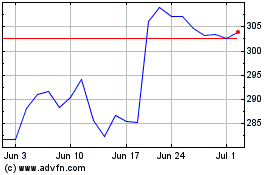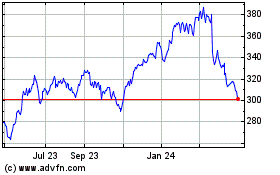Nearly Two-Thirds of Enterprises Feel That Their Networks Are Not Fully Ready to Support Their Business, Finds Accenture Repo...
September 04 2019 - 7:59AM
Business Wire
Misalignment between IT and business needs
cited as among top barriers to limiting the effectiveness of
enterprise networks
A new report from Accenture (NYSE: ACN) reveals that while
enterprises have embraced advanced digital technologies, such as
IoT/edge computing (77 percent), big data/analytics (83 percent)
and digital customer experience (78 percent), only 36 percent are
“very satisfied” that their network currently has the capabilities
required to support their business needs. That leaves 64 percent
that see room for improvement.
Based on a global survey of 300 senior IT and business
executives from large enterprises, the report titled “Network
Readiness Survey, Is your business ready for a connected future?”
shows that less than 40 percent of respondents are “very satisfied”
with their overall capability (36 percent) and bandwidth (38
percent). Half or less reported being “very satisfied” with their
network performance (43 percent), security (50 percent) and
reliability (50 percent). Moreover, these levels remained largely
the same when considering their networks’ ability to meet the needs
of the business in 18-24 months. Less than half (43 percent)
indicated their networks are completely ready to support cloud and
digital technologies.
The report points to the “misalignment between IT and business
needs” as the main obstacle to keeping networks in line with
business demands, identified as a top barrier by 48 percent of
respondents. The second and third most commonly cited barriers were
“inherent complexities between business requirements and
operational needs” (45 percent) and “demands for bandwidth,
performance, etc., outpacing the ability to deliver” (45
percent).
This apparent misalignment between IT and the business is
supported by the disparity in perceived barriers to network
performance when replies are broken down by job title (i.e.,
CIO/CTO, Directors/VPs of Infrastructure/Network and Line of
Business EVP/VP). No single issue appears in the top three barriers
cited by respondents from all job categories. In fact, each role
sees a different barrier as the greatest challenge.
The mismatch of perceptions is also apparent on whether key
network decisions are made in collaboration between IT and the
business. Overall, less than half of respondents said the process
was “always collaborative.” However, CIOs/CTOs tend to see a
greater amount of collaboration, with 58 percent responding “always
collaborative,” compared to 45 percent of business executives and
just 28 percent of their direct reports.
“Business demands have outpaced the ability of IT to deliver
services. Our research shows that organizations have more work to
do to ensure that network limitations do not prevent them from
meeting their current and future business goals. IT and business
leaders need to collaborate more when making decisions about the
network,” said Prasad Sankaran, senior managing director and global
lead of Intelligent Cloud & Infrastructure at Accenture.
“Our clients must be ready for the future amidst escalating
costs, legacy infrastructure and compliance requirements.
Supporting new digital services with existing networks requires a
clear strategy for increasing capacity, deploying new technologies,
and efficient network management. It’s about having a comprehensive
device to cloud infrastructure plan for innovation,” Sankaran
added.
The report was developed in collaboration with Cisco Systems on
the heels of two recently published white papers entitled “Long
Live the Network: The Rise of Network Automation” and “Are You
Going Digital without a Net?”
Methodology
Accenture surveyed 300 senior IT and business executives to
discover how ready enterprise networks are to meet today’s demands,
and how prepared executives feel about meeting future requirements.
The blind survey included executives from companies with annual
revenues in excess of US$1 billion. Respondents came from 10
industries and seven countries. Participants from IT included
CIOs/CTOs, their direct reports, and vice presidents (VPs) or
directors of infrastructure/network. The business respondents
included line-of-business executive vice presidents (EVPs) and
VPs.
About Accenture
Accenture is a leading global professional services company,
providing a broad range of services and solutions in strategy,
consulting, digital, technology and operations. Combining unmatched
experience and specialized skills across more than 40 industries
and all business functions — underpinned by the world’s largest
delivery network — Accenture works at the intersection of business
and technology to help clients improve their performance and create
sustainable value for their stakeholders. With approximately
482,000 people serving clients in more than 120 countries,
Accenture drives innovation to improve the way the world works and
lives. Visit us at www.accenture.com.
Copyright © 2019 Accenture. All rights reserved. Accenture, its
logo, and High Performance Delivered are trademarks of
Accenture.
View source
version on businesswire.com: https://www.businesswire.com/news/home/20190904005008/en/
Mylissa Tsai Accenture +1 917 452 9729
mylissa.tsai@accenture.com
Accenture (NYSE:ACN)
Historical Stock Chart
From Mar 2024 to Apr 2024

Accenture (NYSE:ACN)
Historical Stock Chart
From Apr 2023 to Apr 2024
